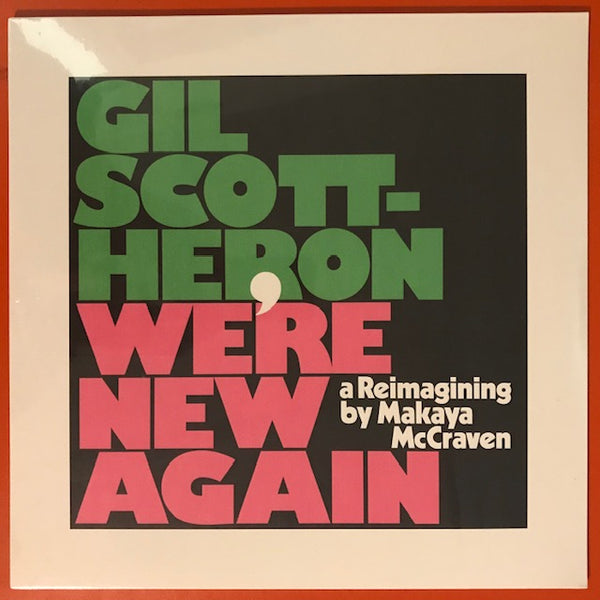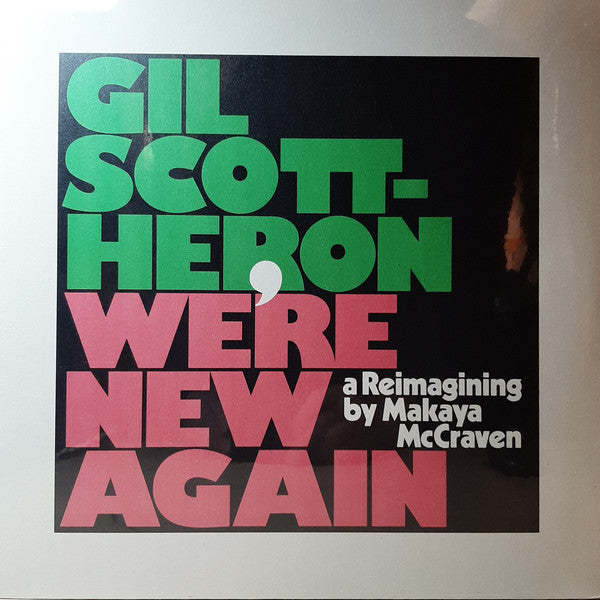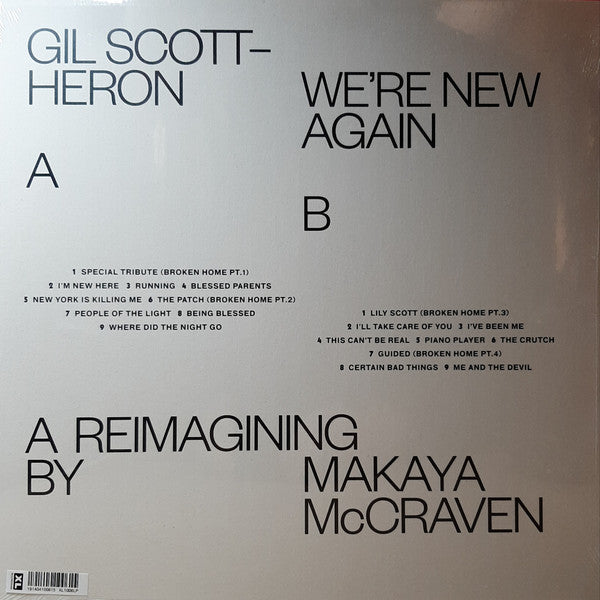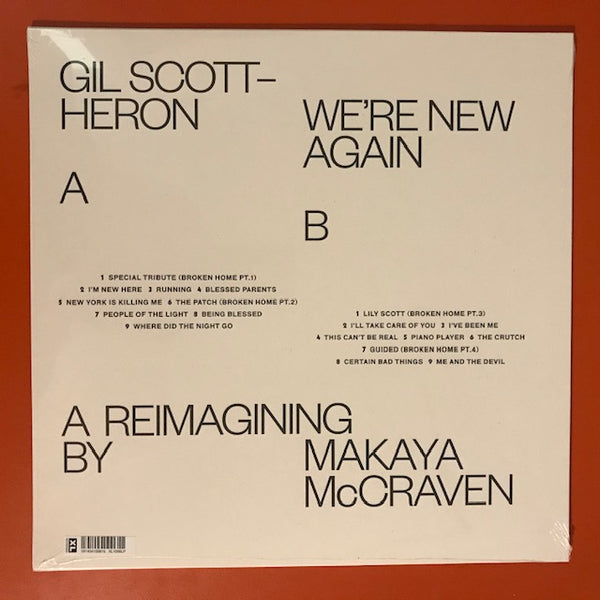Gil Scott-Heron and Makaya McCraven – We're New Again: a Reimagining by Makaya McCraven – New LP
Released the same day (07 Feb 2020) as the 10th anniversary edition of I'm New Here.
Bold, brave and never brazen, whatever you want to call it, the result is clearly amazing (and any negative connotations associated with the word brazen is just the pale king and queen trying to keep people down so they can stay on top...stay bold, and gold as Stevland Wonder and face every morning brave and brazen), this recording clearly deeply respectful and timely for so many reasons, wonderful presentation of Scott-Heron’s final statements from a decade ago, this recording just issued, featuring a group of some of Chitown’s finest (Jeff Parker, Brandee Younger, Junius Paul) huddled tight like brothers on the brick when the Hawk swoops down off Lake Michigan in December, with lots of others contributing to this reimagining, McCraven the master keeping Gil Scott-Heron’s voices and visions upfront. -- winch (green noise records)
Pitchfork: "Scott-Heron's final album, 2010’s I’m New Here, was a moving but unfinished statement from an important but overlooked artist. By the mid-’00s, the writer, poet, and singer had a long and storied career behind him, with more than a dozen albums of word-dense soul and R&B, two novels, and one phrase, “The Revolution Will Not Be Televised,” taken from his song of the same name, that echoed through culture and became more famous than he would ever be. He was a crucial voice of protest who deeply influenced black music across genres—hip-hop especially—but he hadn’t done much in a while. His last LP had been released more than a decade earlier. In the years between, he’d had drug problems, which led to health problems and legal problems, including an extended stretch incarcerated at Riker’s Island. A lot of people had forgotten about Scott-Heron, but Richard Russell, who founded the label XL, remembered, and he got in touch.
"Scott-Heron wasn’t in a place where he could offer much creative input, but Russell persuaded him to make a record, a little at a time, and he built I’m New Here from fragments. In a New Yorker profile of Scott-Heron that ran six months after the album’s release, the writer and singer, then 61, said that he didn’t think of the album as his creation. “This is Richard’s CD,” he told Alec Wilkinson. “My only knowledge when I got to the studio was how he seemed to have wanted this for a long time. You’re in a position to have somebody do something that they really want to do, and it was not something that would hurt me or damage me—why not? All the dreams you show up in are not your own.”
"A decade later, the songs, poems, and conversational snippets Scott-Heron recorded with Russell are showing up in another dream, this one imagined by Chicago drummer and producer Makaya McCraven. It’s the second album-length reworking of the I’m New Here material, following Jamie xx’s 2011 collection We’re New Here, but this one feels definitive. Though Jamie xx assembled a fantastic record, one thick with hypnotic samples and irresistible beats, We’re New Again brings us closer to Scott-Heron’s world.
"Working with his regular circle of collaborators, many of whom have made highly regarded albums of their own in recent years (Jeff Parker on guitar, Brandee Younger on harp, Junius Paul on bass, Ben Lamar Gay on instruments and percussion), McCraven brings Scott-Heron’s work down to earth and situates it in a milieu the elder artist would have recognized. With arrangements that move between dirty blues, angelic spiritual jazz, and free-form drumming, McCraven has created a kind of survey of 20th-century black music that doesn’t draw undue attention to itself, one in which every piece fits together.
"McCraven is both a player and a collagist, splicing together long jams and improvisations into structured pieces. Everything on his records feels close—you hear the instruments more than the rooms they’re recorded in, which can make individual parts sound simultaneously machine-like and deeply funky. He likes compression and uses it artfully, and his beats radiate force and muscle. They’re like a layer of armor behind which his more subtle and delicate musical ideas can develop and grow.
"On We’re New Again, McCraven takes Scott-Heron’s primary themes from his sessions with Russell—what it means to live in fear, the idea of home, how we confront our mortality, the mysterious and transformative power of familial love—and channels them into a concept record. His sources speak to his big-picture ambitions. Via samples, he incorporates music played by both of his parents—his father Stephen McCraven, a drummer, worked with Archie Shepp, the Last Poets, and many others, and his mother, Ágnes Zsigmondi, is a singer—to connect this music to his own history, reinforcing the album’s central concerns of place and lineage.
"The work Scott-Heron recorded for I’m New Here was connected to his memoir, The Last Holiday, which he’d been tinkering with for years and was published the year after his death. The book finds Scott-Heron making history—he was one of the first black students to integrate white schools in Tennessee, and its final sections focus on his desire, alongside Stevie Wonder, to make Martin Luther King Jr.’s birthday a national holiday—but many of its most moving passages are simpler scenes drawn from his childhood. And many of these detail his relationships with his mother and grandmother.
"Even if they didn’t read the memoir, fans of I’m New Here know his grandmother’s name, Lily Scott, because Scott-Heron mentions her in the track “On Coming From a Broken Home.” It’s a piece about not just her love but also the ways a seemingly dysfunctional family can provide all the emotional nourishment a kid might need. McCraven splits “On Coming From a Broken Home” into four parts, ensuring that its words are never far from our minds. “But Lily Scott was absolutely not your mail-order, room-service, typecast, black grandmother,” Scott-Heron speaks, adding later, “I loved her from the absolute marrow of my bones/And we was holdin’ on.”
"McCraven finds a different setting for each section of the poem—the album-opening part one is floating and spacey, part two is a throbbing acoustic blues drone, part three emits the glow of ’70s AM radio, and part four has percussive textures from West Africa—and that eclecticism carries through the rest of the record. “Running,” a powerful incantation about the desire to keep moving even when you know nothing will change, is driven by a propulsive drum break. McCraven turns “New York Is Killing Me” into a dense piano arrangement that sounds like an early-’60s Blue Note recording, with a layer of voices from the Harlem Gospel Choir on the “Lord Have Mercy on Me” refrain that underscores its connection to soul-jazz.
"The record’s cover songs are, in their own way, just as autobiographical. Bill Callahan’s “I’m New Here” suggests scenes from Scott-Heron’s itinerant life. Its narrator is both confident and vulnerable, taking in his surroundings and feeling reborn but also aware that he’ll need human communication to make it through. McCraven gives it his most relaxed and gentle arrangement, as if the hopeful chorus, “No matter how far wrong you’ve gone, you can always turn around,” might actually be true. The exceedingly spare rendition of “I’ll Take Care of You,” by R&B singer Brook Benton, could be an expression of a desire that Scott-Heron could never quite manifest, to be someone else’s place of safety. And Robert Johnson’s “Me and the Devil,” featuring a horn sample from one of McCraven’s father’s recordings, is a dark anthem for a man whose demons were never far behind.
"Early on, Scott-Heron wrote songs about alcoholism (“The Bottle”) and drugs (“Home Is Where the Hatred Is”), but “The Crutch,” which McCraven backs with a filthy electrified blues vamp, feels especially autobiographical. The song is about heroin (“His eyes half-closed revealed his world of nod/A world of lonely men and no love, no god”) but as the harrowing New Yorker profile made clear, by the time Scott-Heron recorded it, he was addicted to crack cocaine. His words and songs showed compassion for addicts and framed chemicals as a way to cope with pain and loneliness. They also turned the concept of “home” found elsewhere on the album inside-out—sometimes, a place of salvation becomes one of torment. The ability to live with such contradictions and give them life with his words is part of what made Scott-Heron’s work special, and McCraven’s music inhabits that complicated space and keeps its sharp edges intact. It’s odd to draw lessons about survival from someone in trouble who is facing the end, but that’s another paradox the album negotiates. McCraven helps us feel it: For a little longer, anyway, Gil Scott-Heron was still here, and he was holding on."









![A. R. Kane – Americana [GREEN HAZE VINYL 2xLP MARKED DOWN] – New LP](http://store.greennoiserecords.com/cdn/shop/products/a1817136229_16_{width}x.jpg?v=1650746279)
![Ackamoor, Idris & The Pyramids – Afro Futuristic Dreams – [2xLP IMPORT] – New LP](http://store.greennoiserecords.com/cdn/shop/files/a2016058937_16_{width}x.jpg?v=1694988943)
![Afous d'Afous – Tenere [Nigeria] – New LP](http://store.greennoiserecords.com/cdn/shop/files/a1759402687_16_{width}x.jpg?v=1722294097)
![African Head Charge – A Trip To Bolgatanga (GLOW-IN-THE-DARK vinyl IMPORT] – New LP](http://store.greennoiserecords.com/cdn/shop/files/a1882827150_16_1_{width}x.jpg?v=1688420213)